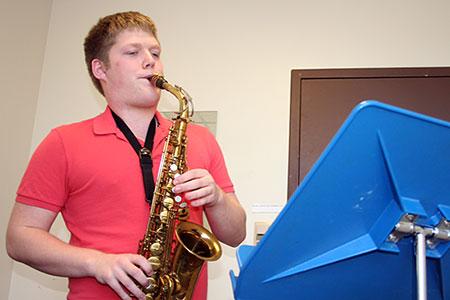
Preparation and balance propels saxophonist
calendar icon23 Apr 2013
Nick May, a freshman from Lincoln, started playing the saxophone for two reasons: Lisa from “The Simpsons,” one of May’s favorite TV shows, played the saxophone, and he could play it himself.
“I also wanted to do French horn and trumpet, but I couldn’t buzz,” May said. “(Playing the saxophone) was easy; I could be loud and makes squeaks. I’m happy.”
May, a saxophone music performance major, began playing when he was in fifth grade. He almost quit because the town he lived in at the time was so small that the middle school students were in the marching band as well. What changed his mind was when he moved to Lincoln for high school and began taking private lessons with University of Nebraska–Lincoln Associate Professor Paul Haar.
“After taking lessons seriously, I just knew it was right for me,” May said. “(Haar) just made me love playing. With him, I enjoy doing it.”
When he first began teaching May, Haar said he was impressed by how eager May was to learn, and that he wasn’t afraid to ask questions.
“He not only practiced what I was teaching, but would come back with more questions,” Haar said. “The level of interest he had in the subject matter was well beyond that of a lot of high school students.”
Transitioning into college did not change May’s eagerness to play and learn more.
“Even now he still kind of surprises me time to time, more often than not,” Haar said. “I’ll think ‘How far along is he in this piece? Hopefully he’s half way,’ and he’s learned it all.”
“Nick was probably one of my first private students that showed me we can’t dismiss the small towns,” Haar added.
Preparation helped him win big
Last semester, May won Lincoln’s Symphony Orchestra Young Artist Competition.
“I acknowledged it without being giddy,” May said. “It didn’t really hit me until a week after, when I was practicing.”
This was May’s second time auditioning for the competition; he did so last year as well. May played the piece “Concertino da Camera” by Jacques Ibert both times. The difference between the two auditions was preparation.
Going into the auditions the first year, May learned he would be playing with a piano accompaniment without rehearsing with them beforehand.
“Let’s hope this going well,” May said he remembers thinking. “That was an interesting experience.”
His second time around, May asked some friends who play piano to help him rehearse the piece a couple of times.
As a winner of the competition, May worked with Lincoln’s Symphony Orchestra and was able to perform and have a solo in a couple of their concerts in February.
“It’s nothing I’ve ever done before and definitely a new and different experience,” May said. “I would love to go back. They can call me any time.”
Haar said he reminds all of his students, not just May, that if he or she has won a competition, it is them being recognized for their talent, not a sign of arrival, and that there is still plenty to learn because no matter what a person is doing, the learning never stops.
“I try to preach to (students) that you do what you do to the best of your ability every day and if something like an award or concerto competition happened, then that’s a positive part,” Haar said.
Balance is key
May is involved with Big Band, the saxophone choir, a jazz combo and two different saxophone quartets. He said each day he tries to practice about two to three hours and focuses on different ensembles.
“I honestly don’t know how, but they somehow balance themselves out already,” he said.
May said he attempts to keep his saxophone playing equally balanced between classical and jazz saxophone music. He also balances his time between playing all types of saxophone: alto, tenor, soprano and baritone.
“I’m more or less a tenor guy though,” May said.
Currently, Haar said what he and May, along with many other students, are working on are the things not necessarily related to a career in music, like time management. But he said he’s also teaching students not to take things so seriously because life experience adds to the emotion of music.
“And to be mindful of being a freshman in college,” Haar said. “Yes, be dedicated to music and be dedicated to school, but be mindful of the fact that you’re still in college. You’re 18—go to a football game, go to a party responsibly. Those are the things that make you a better musician.”
Even though he is a freshman, May plans on sticking with his performance major throughout his undergraduate career and pursue his master’s and doctorate in hopes of becoming a college professor and teach private lessons. He also still wishes to perform often outside of teaching.
“That’s definitely the most logical thing for me,” May said. “But if I could do just performing I would.”
-Ally Phillips, College of Journalism and Mass Communications